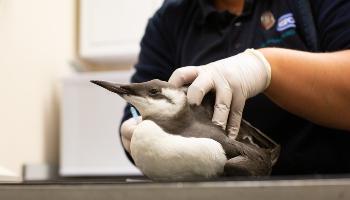Bird flu warning
Due to the Avian Influenza Prevention Zone (AIPZ) currently in place across the UK, some baby birds can't be handled. Please follow our bird flu and baby birds advice to check which species can be handled and what to do.
When to help a baby gull
It's not unusual for baby gulls to fall from a cliff or rooftop nests. Uninjured baby gulls should be left where they are in the care of their parents. People and animals need to stay away and you shouldn't feed the baby gull any food.
If the gull chick is very young (very small, still covered in a fluffy down and prefers to run rather than fly away), then you can return it to a roof or adjacent high spot (like a fence or wall) if it's in danger. Only do this where possible and safe to do so. It's best to monitor them to ensure the parents are still attending.
After 24 hours, if the gull chick's condition has worsened take it to a nearby vet or wildlife rehabilitator. Be careful - concerned parent gulls may swoop and try to protect their chick if you approach it.
If a gull is sick or injured
If the baby gull is sick or injured, or their condition is deteriorating, contact your local wildlife rehabilitation centre or vet for advice.




